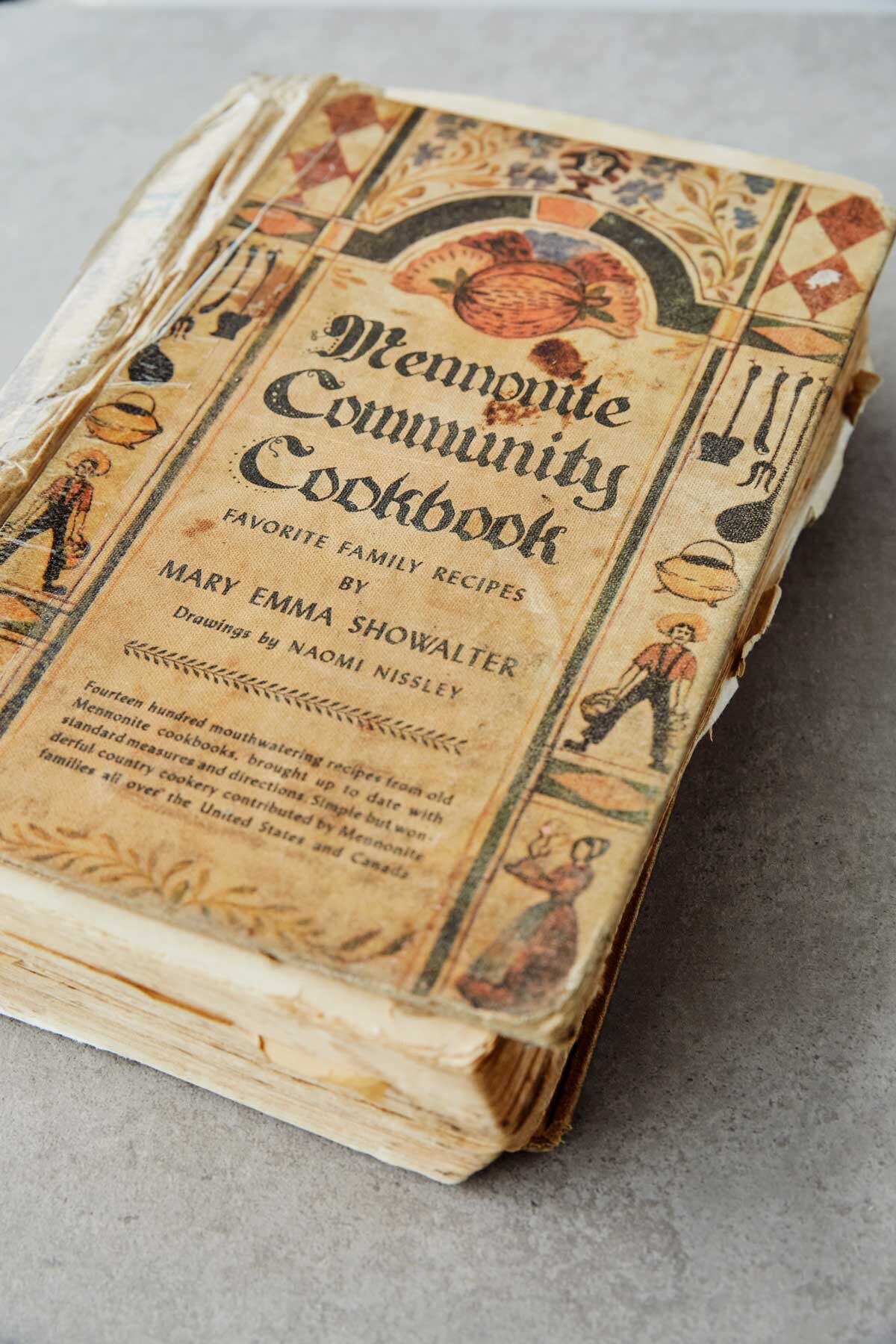About this Project
In late 2018, my husband Paul and I had our friends Meghan and Andrew over for dinner. I had been flipping through my Grandma Lena’s copy of the Mennonite Community Cookbook, the one I inherited after she died. With Andrew, who’s an incredible and curious cook, and Meghan, a devoted vegan like me, we had the idea of making plant-based versions of these recipes. We knew we could do it in a way that maintained the spirit of the original dishes.
What started as a lovely evening turned into two years of talking with my family about our history and having lots of friends come together at our dinner table over many nights to test recipes.
But there’s more to this book than that. Flipping through Grandma Lena’s book that first day brought a feeling of deep longing for my family and for my roots. Grandma Marjorie, my last living grandparent, passed just a year earlier. Our hearts were broken. You see, I grew up in a pretty big, close and liberal Mennonite family on a crop farm just outside of Kitchener-Waterloo, Ontario, Canada. No bonnets and buggies for me. But Grandma Lena grew up in Floradale, and was raised an Old Order Mennonite. Without going too deep into Mennonite history (there are some great books for that, including one specifically about the region where I was raised called The Mennonites of St. Jacobs and Elmira, by Barb Draper), it’s important to understand that Mennonites have deep cultural connections as well as connections to their Anabaptist faith.
I haven’t been to church in decades. I spent a big chunk of my younger years traipsing around the world in a pretty unsuccessful punk rock band, rather than learning how to farm or can food. But there are two big themes to my life, and I attribute them to the way that I was brought up, which had more than a little to do with my heritage.
First, I work pretty damn hard. My Grandpa Reuben Musselman lived by the philosophy that you always “leave it better than you found it.” One day when my band rolled into town on a short break from tour, we just had to visit my Grandma Marjorie and Grandpa Reuben. The first thing Grandpa did after checking out our cherry red Chevy tour van was tear out the loft bed we had built in the back. Then he rebuilt it and put it back in, more sturdy, and taking up less space than before. After he was done we could fit in all of our gear and backpacks without things spilling over into the front seats. He left it better than he found it. I’ve taken that value with me into every job I’ve ever had.
Second, is the “Big Tent” philosophy. One of the highlights of making this book was bringing people together around the table, around food. Growing up, we were always getting together with the family or having big potlucks at Bloomingdale Mennonite Church. Grandma Lena would make strawberry pies for the Mennonite Relief sale every year. Grandma Marjorie would be in the kitchen at Sterling Mennonite, setting out cookies and squares every Sunday after church. She never turned anyone away. I could bring whoever into her house at any time and she would put on a pot of coffee and start plating some lemon bread. After my father died — when I was 13 years old — our fridge and freezer were full of casseroles lovingly prepared and delivered by our neighbours, family, and members of our church community.
The Big Tent philosophy is essential to who I am, and by bringing people together we also leave things better than we found them. Inviting people to my table — some of us old friends, some of us strangers — is one of the ways I demonstrate my Big Tent values. Being able to serve up kindness, nourishment, and a sense of belonging is a genuine calling for me and how I call in community, family, and chosen family.
These two threads are ingrained within these pages. When I think about these recipes I’ve adapted from my grandmother’s well-used book, I’m overcome with nostalgia. I’m filled with memories of those in my family we’ve lost — the mourning and celebration. This is not to say that the ways I’ve interpreted these recipes are going to be better than how your Grandma made them, or even how you might think to interpret them yourself. But what I want to convey is the care and work I’ve put into my plant-based interpretation, another value for which I hold deep conviction.
I really think that a primarily plant-based future holds the possibility to improve our environmental outlook for future generations, for my own nephew and nieces: Owen, Leah and Cassidy. It eliminates unnecessary cruelty, suffering, pollution, and the psychological human toll of factory farming. These recipes rely on food that can mostly be sourced locally to me and asks of us that we share what we have in abundance and leave nothing to waste.
I hope this book will revive the joy of cooking together, if that’s something you’ve lost. I hope that people will share it with their friends and families and come together to cook and eat. I hope you invite someone new over. Maybe introduce them to someone else. Maybe drop off a casserole to someone in need. Or just pop in for a visit.

